NCE2册语法
新概念英语句型NCE2

句型:P402.9(主语+adj+that, 比较I am glad to meet you.中文习惯:I am confidenet about sth)Though they are ..., the men are cheerful and confident that they will get out soon.They are positive that.....P386.10Only one or two people have objected that the students will drive too fast!P422.4The great statue, which was designed by ..., took ten years to complete. (不一定要用it takes sb something to do sth)P202.8...and it contained half the money he had lost.P158.7It was stolen twenty years ago when Dan was a boy of fifteen!P434.4...,the dead are said to return to their homes and they are welcomed by the living. (不只有用法:it is said that)P300.7Imagine their surprise and delight when they broke open the packing cases and found that.... (祈使句?! 无主句)P268.11It is said that if anyone touches the tree, he will have bad luck. (典型的真实条件句.if句提前加逗号.)倒装:P366.3...and only on one occasion have I ever felt frightened.P166.3Among them will be the Debbie's mother, who swam the Channel herself when she was a girl.时态以及时态搭配:P350.7When a light passenger plane flew off course some time ago, it crashed in the mountains and its pilot was killed.(when从句主句都用一般过去式,动作先后时间间隔很短。
NCE2 Lesson 13

Lesson 13 单词讲解1. group n. 小组,团体2. pop singer 流行歌手pop musicpop songs3. club n. 俱乐部a football cluba club membera night club4. performance n. 演出give a performanceworking performanceperform v.5. occasion n. 场合on these occasionsonce … and on another occasion … occasionally adv.Lesson 13 课文&语法讲解1. At present, they are visiting …present n. 现在/礼物Yesterday is history.Tomorrow is a mystery.Today is a gift –That’s why it is called “the present”. all parts of the country = all over the country2. They will be arriving here tomorrow.将来进行时形式:will / shall + be doing用法:They will be waiting here at 10:00 tomorrow.You __________ (enjoy) yourself.They __________ (discuss) it again.I __________ (take) care of the children while you are busy.将来进行时 will / shall + be doing 否定/疑问:They will not be waiting here …Will they be waiting here …?How ________ staying? For five days.A. long they will beB. they will beC. long will they beD. long they be将来进行时形式:will / shall + be doing用法:They will be waiting here at 10:00 tomorrow. 否定/疑问:They will not be waiting here …Will they be waiting here …?补充:一般将来时 vs. 将来进行时… will be arriving …… will be coming … and … will be meeting …… will be singing …… will be staying …3. the Workers’ Club名词所有格Lily bookLily’s booka teacher’s booksteacher s’ books特殊:James’ car / James’s car3. the Workers’ Club名词所有格a teacher’s booksteacher s’ books苏珊的钱包Susan’s wallet学生们的练习册students’ exercise books 二十分钟的时间twenty minutes’ time4. As usual, the police will have a difficult time. as usualShe is late as usual.business as usualpolice / policeman5. They will be trying to keep order. try to do sth.try doing sth.order n.keep orderget sth. in orderMay I take your order, please?Lesson 13 知识拓展(大学版)Key points:将来进行时形式:will / shall + be doing用法:They will be waiting here at 10:00 tomorrow.They will be arriving tomorrow.I feel so excited! At this time tomorrow morning I ______ to Paris.A.will be flyingB.will flyC.have been flyingD.have flownI feel so excited! At this time tomorrow morning I ______ to Paris.A.will be flyingB.will flyC.have been flyingD.have flown-Can I call you back at five o’clock this afternoon?-I’m sorry, but by then I ______ a meeting. How about six?A.haveB.will haveC.will be havingD.am having-Can I call you back at five o’clock this afternoon?-I’m sorry, but by then I ______ a meeting. How about six?A.haveB.will haveC.will be havingD.am having-Guess what, we’ve got our visas for a short-term visit to the Thailand this summer.-How nice! You ______ a different culture then.A.will be experiencingB.have experiencedC.have been experiencingD.will have experienced-Guess what, we’ve got our visas for a short-term visit to the Thailand this summer.-How nice! You ______ a different culture then.A.will be experiencingB.have experiencedC.have been experiencingD.will have experiencedLadies and gentlemen, may I have your attention, please? Please fasten your seat belts.The plane will be taking off in ten minutes.-Where are you? The meeting is about to begin. -Don’t worry! I will be arriving there on time. -Please hurry up.。
NCE2 lesson10 (被动语法)

最近它被一位客人弄坏了。 她用它弹奏爵士乐! 她按键太猛,把两根弦按断了. play n. 玩,演奏(乐器等) ① 跟球类连用, 直接+球类; ② 跟乐器连用, +the+乐器, 演奏乐器而非音乐 ③ play music on + 乐器, 一定要用“on”
Dream what u want to dream
Lesson 10
① v. 使不悦或生气, 震惊
跟人的情绪有关的动词的宾语往往是“人” (以sth.为主语) The news shocks me. 这个消息使我震惊。 ② adj. 令人震惊的 The news is shocking. ③ adj. 感到震惊 凡是能够用“人” 做宾语, 又是表示人的情绪活动的动词, 有两个形容词:令人……(v+ing);感到……(v+ed) I'm shocked at the news of his death. ④ n. 震惊 get a shock 感到震惊
乐器 musical instrument 器具;仪器
instrumental music 器乐
例句:Most pupils learn to play a musical instrument.
Dream what u want to dream
Lesson 10
n. 古钢琴,翼琴
Dream what u want to dream
n.琴键
Lesson 10
n.弦
v.使不悦或生气; 震惊
v.允许
v.碰;触摸
Dream what u want to dream
Lesson 10
爵士乐
新概念英语2第二课 NCE2_Lesson02

★ aunt n. 姑,姨,婶,舅妈
• 所有长一辈的女性都用这个称呼 • 男性则是uncle: 叔叔 • 他们的孩子:cousin 堂兄妹(不分男女) • cousin的孩子:nephew 外甥,侄子
niece 外甥女,侄女
★repeat v. 重复(=Pardon)
① vt. 重复 • 你能重复最后一个词吗? • Will you repeat the last word? • 跟著我念这些句子 • Repeat these sentences after me. ② vi. 重做,重说 • 她只是反覆地做同样的事 • She did nothing but repeated.
1、在肯定句中,它与表示持续性状态的动词连用,表示某动作持续到 某一时刻:
我会在这里等到5点钟。 I’ll wait here until 5. 直到他回来为止,他爸爸都是活着的. His father was alive until he came back. 2、在否定句中,它通常与描述短暂动作的动词连用,“直到……才”: 她到6点才能来。 She cannot arrive until 6. 直到他回来,他爸爸才死. His father didn't die until he came back.
★ring(rang. rung)
① vt. 鸣,(铃、电话等)响(往往是提醒人做某事) • 每天早上表都在六点钟响。 • Every morning the clock rings at 6. • 电话/门铃响了。 • The telephone(door bell) is ringing. ② vt. 打电话给(美语中用call) • 明天我会给你打电话 • Tomorrow I'll ring you. ③ n. (打)电话 give sb. a ring • 记得明天给我打电话 • Remember to give me a ring. /Remember to ring me. ④ n. 戒指 • 他给了她一个钻石戒指作为生日礼物 • He gives her a diamond ring as a birthday present.
NCE-2-lesson2

7."It's raining again."
又下雨了。 体现下雨、下雪、踢球、读书等动作多用进行时态。 It is snowing in great flakes. 正值大雪纷飞。
We are playing football on the street. 我们在街上踢球。
I am reading a letter now. 我正在第一封信。
He is leaving。他就要准备走了。
We are starting。我们准备开始了。
Most young people will be meeting the pop singers at the
airport。
大多数年轻人即将在机场迎接这些流行歌手。
11." But I'm still having breakfast," I said.
Jane is just dressing up. 简正在打扮。
Mrs. Smith is cooking now. 史密斯太太目前正在做饭。
一般目前时能够表达习惯性动作,往往与频度副词连用, 如often, always, sometimes, never等:
Do you often come here? 你常来这儿吗? Helen never writes to her brother Tony.
dinner正餐(多为晚餐);snack原指小吃,可指夜宵, meal广义上旳“餐”,没有时间限制。
3、Last Sunday I got up very late. 上周日我起得很晚。
(1)Last Sunday为前置时间状语,也能够放于句尾。 (2) 变化如下:
(3) I got up very late last Sunday. (4) 但时间状语前置更强调时间。 (2 )比较学习:
NCE2 Lesson 2

Lesson 2 单词讲解1. until prep. 直到……为止until lunchtimeI go to school until Friday.not … until 直到……才I’m not free until Friday.I didn’t get up until 10 o’clock this morning.2. outsideadj. 在外面的outside worldprep. 在…的外面outside the downtown arean. 外面; 外部He seems gentle on the outside.adv. 在外面Please wait outside.3. ringv. (铃、电话等)响; 打电话 The phone is ringing.I will ring you (up) later.n. 打电话; 戒指Give me a ring later.a wedding ring4. repeat v. 重复Pardon?Would you please repeat it?Would you please explain that word?Lesson 2 课文&语法讲解1. It was …表示时间:It’s 10 o’clock in the morning.表示天气:It’s snowing now.表示距离:It’s 2 kilometers to the store.确定人的身份:It’s Tim on the phone.2. I never get up early ...alwaysusually / often / frequentlysometimesseldomrarelyneverHelen rarely goes to the movies.3. … on Sunday s.on 表示在某一天on Mondayon Sept. 10on that daySundays 复数表示经常性的行为 I don’t go to work on Fridays.4. I sometimes stay …5. … stay in bed …表示卧床、睡觉时bed前不加冠词go to bedHe was sick in bed.6. …until lunchtime.until在肯定句中和表示持续性状态的动词连用表示动作持续到某时Wait until two o’clock in the afternoon.until在否定句和表示短暂动作的动词连用表示“直到…才”He didn’t come home until midnight.7. Last Sunday ...比较:on Sundaynext Saturdaythis Sundaylast Wednesday8. I looked out of ...look out of 朝…外看look out of the doorlook out 小心;注意Look out when you go across the street.9. It was dark ...It gets dark early in winter.10. “What a day!” …It is a terrible day.What + a / an + adj. + n. (名词单数) + 主语 + 谓语 +! What a terrible day it is!What + a / an + adj. + n. (名词单数) + 主语 + 谓语 +! He is a hardworking young man.What a hardworking young man he is!What a hardworking young man!They are hardworking young men.What + adj. + n. (可数名词复数) + 主语 + 谓语 +! What hardworking young men they are!We are enjoying delicious bread.What + adj. + n. (不可数名词) + 主语 + 谓语 +! What delicious bread we are enjoying!How + adj. / adv. + 主语 + 谓语 +! The movie is amazing.How amazing the movie is!He works hard.How hard he works!11. … the telephone rang.ring rang rungThe telephone is ringing.12. It was my …it 中性代词,指一物、一事、或一人It’s me.It’s the postman.13. “I’ve just arrived by train,” …by busby bikeby airby caron footWill’s car broke down and he had to return home on foot.14. I’m coming to see …瞬间动词用于现在进行时表示按计划、安排将来要发生的动作或状态come, go, arrive, leave …He’s leaving tomorrow.15. … I’m still having breakfast …零冠词have breakfasthave lunchhave dinner16. Dear me!My goodness!Oh, my god!Lesson 2 知识拓展(大学版)倒装:Not until … 直到…才Not until …,谓语助动词 + 主语 + 谓语动词Jane d idn’t send the email until she finished her lunch.Not until she finished her lunch did Jane send the email.强调结构It is / was not until + 时间从句或短语 + that + 主句部分Jane d idn’t send the email until she finished her lunch.It was not until she finished her lunch that Jane sent the email.比较:Not until she finished her lunch did Jane send the email.。
NCE2Lesson5
★distance n. 距离 • 保持距离 • keep distance • distant adj.远距离的 • importance n. 重要 • important adj. 重要的 • difference n. 不同 • different adj. 不同的
★request • ① n. 要求, 请求 • request for 对……有请求, 有需求 • 他同意了我延长时间的请求。 • He agreed with my request for more time. • 她向加里请求帮助。 • She sent a request for help to Gary. • ② v. 要求, 请求 • request sb.to do sth. 要求某人做…… • =ask sb.to do sth. • (对人要求习惯用被动语态) • 在饭店里不能吸烟。 • You are requested not to smoke in the restaurant.
Grammar
2一般过去时常与具体的表示过去的时间状语连用; 现在完成时通常与模糊时间状语连用或无时间状语。
一般过去时的时间状语: yesterday, last week,…ago, in1990, in October, just now, …-- 具体的时间状语 现在完成时的时间状语: for, since, so far, ever, never, jus yet, till/until, up to now, in the past few years, recently … --模糊的时间状语 句子中如有过去时的时间副词(如 yesterday, last, week, in 1960)时,不能使用现在完成时,要用过去时 错Tom has written a letter to his parents last night. 对Tom wrote a letter to his parents last night.
NCE 2-Lesson 10
• He borrowed one of my records. • ___________________________ • She showed me one of John’s pictures. • ___________________________ • It was one of her ideas. • ___________________________ • One of your letters was found on my desk. • ___________________________ • Some of their friends came to see me. • ___________________________
simple past + passive voice
• Who built this bridge? • Prisoners of war built this bridge in 1942. • When was this bridge built? • This bridge was built in 1942. • In the first question we want to know who
Exercises
Keys
• 1.(a.) 2.(d) 3.(d) 4.(c) 5.(b) • 6.(c) 7.(a) 8.(c) 9.(a) 10.(c) • 11.(c) 12.(a)
vocabulary
• jazz • musical • instrument • clavichord • recently • damage
• key • string • shock • allow • touch
NCE2 L24
• sympathetic [,simpə'θetik] adj. 表示同情 的 • be sympathetic to/towards sb 对某人表 示同情 • be sympathetic with sb a sympathetic look 同情的表情 • a sympathetic smile 同情的微笑 • a sympathetic remark 同情的语言 • eg. The hotel manager was sympathetic to me. 这个旅店经理对我表示同情。
• honestly adv. 诚实地 • eg. I honestly don’t know. 我真地不知 道。 • honestly 修饰整个句子,无比较级变化 老实说,坦白说 • eg. Honestly, that’s exactly what she said. 老实说,那就是她说的原话。 • honestly speaking 坦白说 • generally speaking 一般来说 • frankly speaking 坦白地说
manager n. 经理,管理人 1) manage v. 经营,管理 management n. 管理 eg. I want to manage my own company one day. 我想有一天经营自己的公司 • manage/ run/operate a shop 经营一家商 店 • manage a business 经营公司 manage a factory 经营一家工厂 manage money 理财 • • • •
• complain v. 抱怨 • 1) complain to sb about/at sth 对某人抱怨某 事 • eg. I don’t like you. You are always complaining! 我不喜欢你。你总是抱怨。 • eg. What was the weather like on your holiday? 你的假日天气怎样? • I can’t complain. 没说的 / Couldn’t be better. • 2) complain that… 抱怨 • 3) complainant [kəm'pleinənt] n. 原告,控 诉人 / plaintiff ['pleɪntɪf] n.<律>原告
NCE第二册Lesson3
send big
cardspatossemdy friends.
. I got up
On the
last and
maddaey I
bought
a thirtyd-eci
seven cardesar.lyI
the
whole
but I did not write a
day in my room,
card.
第十二页,编辑于星期五:十七点 五十一分。
★lend
v. 借给 (借出) • lend sth. to sb=lend sb. sth. • 你能借我20美元吗?我明天就还。
Can you lend me $20 please? I’ll pay/give it back tomorrow. • borrow from(借进): • borrow sth. from sb(不能用 borrow sb. sth. (×)) • 他昨天借了我的笔,还没还呢。
• all of the students
第十五页,编辑于星期五:十七点 五十一分。
★single
adj. 单身的, 单程的, 单一的 • a single bed单人床 • a single ticket单程票 • single 单一的←→ double 双倍的 • single 单身的←→married已婚的
★ spoil (spoiled/spoilt)
• break: 破坏,break the windows 打破玻 璃
• damage: 破坏, 程度不一定很重 ;被破坏 的对象受损程度较小,可以修复
• destroy : 破坏, 彻底摧毁,不能修复。 • 以上三个是指物理上的破坏, 而spoil主要指
- 1、下载文档前请自行甄别文档内容的完整性,平台不提供额外的编辑、内容补充、找答案等附加服务。
- 2、"仅部分预览"的文档,不可在线预览部分如存在完整性等问题,可反馈申请退款(可完整预览的文档不适用该条件!)。
- 3、如文档侵犯您的权益,请联系客服反馈,我们会尽快为您处理(人工客服工作时间:9:00-18:30)。
the day before yesterday前天
last night昨天夜里 ago(至今)以前 tomorrow明天
the day after tomorrow后天 two days later两天后 next week下周 the next(following) week第二周 地点状语 动词
have/has been done
have/has been being done
过去
was/were done
was/were being done
had been done
had been being done
将来
will/shall be done
will be being done
will have been done
will have been being done
过去 将来
would be done
would be being done
would have been would have done been being done
在英语中,只用作句子的一 个成分,不能独立存在的句 子称之为从句。
一字不改地直接引用他人的 话,叫做直接引语。
定语从句
副词性从句
状语从句
结果状语从句 目的状语从句 让步状语从句
比较状语从句
方式状语从句
here这里
come来
there那里
go去
一般现在→一般过去
现在→过去
现在进行→过去进行
现在完成→过去完成 一般过去→过去完成
过去→过去完成
过去进行→过去完成进行
过去完成→过去完成 一般将来→过去将来
将来→过去将来
将来进行→过去将来进行 将来完成→过去将来完成
主句不完整
没有”,” 有”that”
过去 现在 时间
将来 过去将来
时态
某个时间里发生的动作或状态; 习惯性、经常性的动作、行为
一般 进行
状态 完成 完成进行
某个时间正在进行的动作或状态
某个时间之前完成的动作或状态 某个时间之前完成的动作或状态 并持续进行
状态 时间
一般 am/is/are
进行 (be doing) am/is/are being am/is/are doing was/were being was/were doing will be being
because, as, for so…that, such…that (so)that, in order that, in order to, lest as…as, not as/so…as, more…than, less…than
状语从句
目的状语从句 比较状语从句
让步状语从句
方式状语从句 地点状语从句
非真实条件句(虚拟语气) 主过去将来从一般过去
if, unless, as(so) long as
because, as, since既然, for
so…that, such…that
so that, in order that
as…as, not as/so…as, more…than, less…than
用自己的话对他人的话加以 转述,叫做间接引语。
引语 用词
直接引语
间接引语 that那个 those那些 then那时 that day那天 that week那周
指示代词
this这个
these这些 now现在 today今天 this week本周
yesterday昨天
时间状语
the day before前一天 two days before两天前
though, although, even if/though, as
as, just as, as if
where, wherever
名词性从句
主语从句 宾语从句 表语从句 同位语从句 限定性定语从句 非限定性定语从句 时间状语从句 地点状语从句 条件状语从句 原因状语从句
形容词性从句 从句
现在 do/does do was/were 过去 did
will/shall be
将来 will/shall do would be would do
will be doing
would be being would be doing
will have done
would have been would have done
though, although, even if/though, as
as, just as, as if where, wherever
when, while, as, before, after,no sooner…than, hardly…when, not…until, since
真实条件句 主将从现
过去 将来
主语是动作的执行者
主语是动作的承受者
1.不知道谁是动作的执行者 2.需要强调动作的承受者
Be动词加上动词的过去分词 be done
状态 时间
一般
进行 (be doing)
完成 (have done)
完成进行 (have been doing)
现在
am/is/are done
am/is/are being done
完成 (have done)
have/has been have/has done had been had done will have been
完成进行 (have been doing) have/has been being
have/has been doing had been being had been doing will have been being will have been doing would have been being would have been doing
主句完整
有”,” 没有”that”
时间状语从句
条件状语从句 原因状语从句 结果状语从句
when, while, as, before, after, no sooner…than, hardly…when, not…until, since
If, unless, as(so) long as
